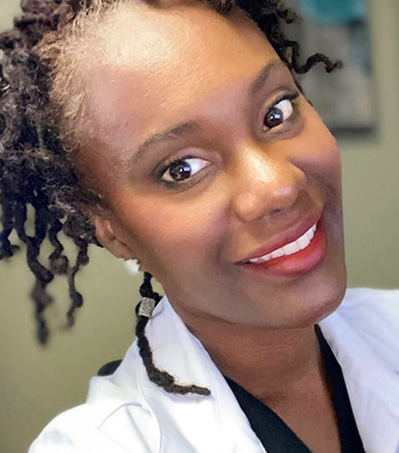What One Black Birth Worker Wants You to Know About Advocating for Yourself

Researching. Educating yourself. Asking all “the right” questions.
These are a few things moms-to-be can do when looking for a provider, but there are times when these actions alone still may not be enough.
Black women in America die at three to four times the rate of white women from pregnancy and child-birth related issues. Yet, 60 percent of maternal deaths are preventable.
While the effort for maternal health equity has become more visible in recent years, Black maternal health disparities continue.
Finding a provider that best serves you and your family can feel unnerving, especially for pregnant Black women.
That’s why one childbirth educator wants these women to know what steps they can take to ensure their maternal care needs are met with respect, awareness and dignity.
Nicha Cumberbatch is a doula, physician’s assistant and the Director of Population Health Curriculum at Spora Health, a culture-centered telehealth service.

Building a support network and investigating providers in advance are necessary to the start your maternal health plan, but it comes down to one key factor: your comfort.
“For many moms-to-be what matters most is if they feel respected and comfortable with the provider,” Cumberbatch told Hey, Black Mom!
That can include finding a providers of your own cultural background or seeking an OBGYN who supports your birthing plan. Cumberbatch said every doctor may not offer services that align with your vision.
“Be upfront about your needs and desires, and don’t be afraid to shop around for the provider who will be the best fit.”
Nicha Cumberbatch, Director of Population Health Curriculum at Spora Health
“Spend some time thinking about what’s most important to you: what type of support are you looking for during pregnancy? Are you envisioning a “traditional” hospital birth, or a medication-free birth at home? Are you looking to incorporate spiritual traditions?,” she said. “Not every physician will support their patients in alternative birthing styles, like at-home births. If this is something you are interested in exploring, do your research first to ensure that your provider will be able to support you through the journey that’s best for you. Be upfront about your needs and desires, and don’t be afraid to shop around for the provider who will be the best fit.”
During this journey, Cumberbatch encourages women to have an active voice in their care. Her thought: no one knows what you feel better than you do.
Even though you can speak up if you’re uncomfortable, it can be easier said than done. That’s where expecting women can benefit from a support network.
Cumberbatch suggests adding people to your birthing system, whether it’s a doula or midwife, partner, trusted friend or relative.
These people can help advocate on your behalf or be a sounding board for important decisions or concerns that arise throughout your pregnancy.
“Remember that you should never feel out of line for expressing how you are feeling and communicating your needs.”
For example, if you’re having trouble pushing back to your provider, you can use someone from your trusted network to simply role play the conversation.
Seeking out a second opinion can be another way to help manage somewhat apprehensive conversations at a doctor’s office.
“It can also be wise to do your own research ahead of time, or consult another physician for a second opinion, to help guide your conversation,” Cumberbatch said. “Lastly, remember that you should never feel out of line for expressing how you are feeling and communicating your needs.”
A mom-to-be’s work in advocating for herself isn’t hers alone, though.
While the country has made strides, it will still take a total effort from healthcare providers of all backgrounds and policymakers to improve Black maternal health. Black women-led organizations such as Black Mamas Matter Alliance have been an integral part of this movement of change.
“We still have a long way to go to ensuring Black women receive equitable maternal care, but such initiatives are absolutely a step in the right direction, and mean we can go further to once and for all address maternal care disparities that exist for Black birthing people,” Cumberbatch said.
For Cumberbatch’s comprehensive Q&A interview on how Black pregnant women can advocate for themselves, click HERE.
